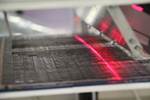FACC awarded inspection robot research project
The project aims to develop a new generation of inspection robots, which will be used for a vast range of inspection tasks — without programming effort.
FACC (Ried im Innkreis, Austria) announced Aug. 8 that it has been awarded a three-year research project in the field of robotics entitled “SPIRIT- A software framework for the efficient setup of industrial inspection robots.” The project under the lead of Profactor GmbH (Steyr, Austria) along with eight international scientific and industrial partners from Austria, Germany and Italy aims to develop a new generation of inspection robots, which will be used for a vast range of inspection tasks — without programming effort.
“The goal of the project, in line with our aim of advancing robotic solutions, is to replace the time-consuming and highly skilled task of robot programming with simply configuring the inspection task,” explains Helmuth Hoeller, director of the NDT division at FACC.
When a new component or a complex shape is to be inspected, the main challenge with inspection robots is to plan the robot motion path in such a way that the whole surface of the component is inspected. This process is usually carried out by specialists and is therefore resource and time intensive. SPIRIT aims to move this task from the programming level to simple configuration, thereby saving time and reducing the resources required.
The software developed within the framework of SPIRIT aims at the development of inspection robots, which can deal with a wide range of challenges such as switching between different inspection technologies and inspecting new parts. According to FACC, all that the inspection robot will need is a CAD model of the component along with the CAD model of the work cell — to avoid collisions. Given this information, it will process the selected inspection technology and automatically generate an inspection program for the particular task at hand.
During the demonstration phase at FACC, the robot will be used to inspect a winglet, which will involve X-ray radiography. The robot will then switch to a second technique, active thermography, and configure the inspection with the additional technique. In this way, relevant areas can subsequently be subjected to a fast test, thereby speeding up the inspection process with multiple techniques.
According to FACC, the robot will also be able to optimize the inspection process in real-time while it is running. For instance, in the case of unknown deformations, which are not accurately represented in the CAD model, slight mispositions of components or X-ray inspections where the sensor needs to be adjusted to the orientation of the honeycomb core in a composite part, the required optimization will be performed spontaneously.
Related Content
-
Protecting EV motors more efficiently
Motors for electric vehicles are expected to benefit from Trelleborg’s thermoplastic composite rotor sleeve design, which advances materials and processes to produce a lightweight, energy-efficient component.
-
The basics of composite drawing interpretation
Knowing the fundamentals for reading drawings — including master ply tables, ply definition diagrams and more — lays a foundation for proper composite design evaluation.
-
ASCEND program update: Designing next-gen, high-rate auto and aerospace composites
GKN Aerospace, McLaren Automotive and U.K.-based partners share goals and progress aiming at high-rate, Industry 4.0-enabled, sustainable materials and processes.

.png;width=70;height=70;mode=crop)














